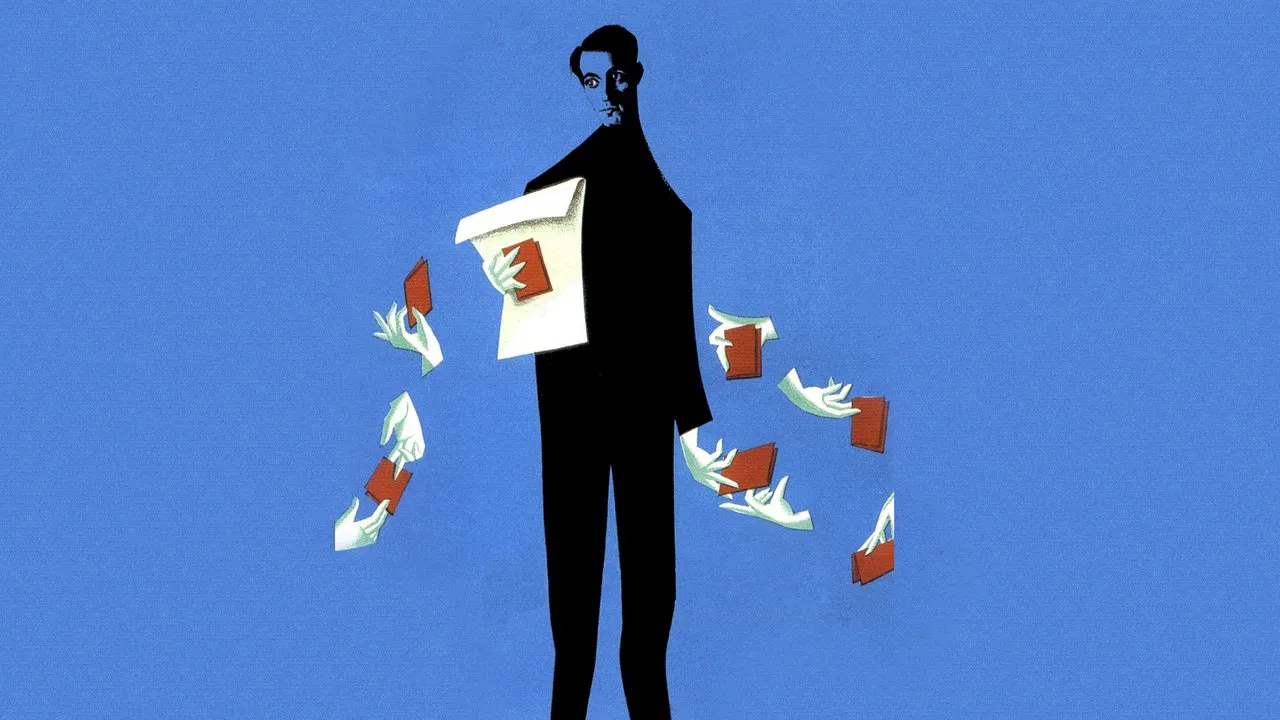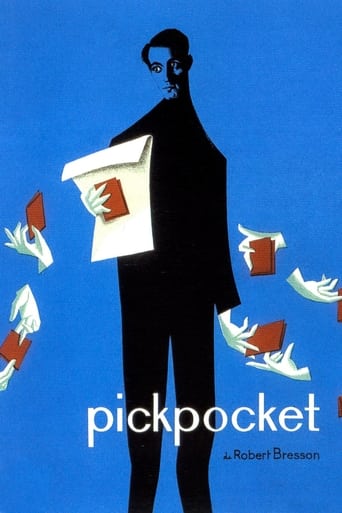

recommended
... View MoreThe movie turns out to be a little better than the average. Starting from a romantic formula often seen in the cinema, it ends in the most predictable (and somewhat bland) way.
... View MoreThe movie is made so realistic it has a lot of that WoW feeling at the right moments and never tooo over the top. the suspense is done so well and the emotion is felt. Very well put together with the music and all.
... View MoreGreat movie. Not sure what people expected but I found it highly entertaining.
... View MorePICKPOCKET is a touching crime drama about humanity and search for self-realization. Film was a loosely based on the novel Crime and Punishment by Fyodor Dostoevsky. The main protagonist is a lonely young man who has decided to become a pickpocket. His dying mother cherishes a young neighbor in whom the young man falls in love. He was arrested after a failed robbery. He was watched by local inspector. Soon, he becomes a member of a group of petty pickpockets...Bresson style is quite meticulous and somewhat minimalistic. The protagonists have offered a realistic story through cold emotions. It's hard to believe such relationships in the story. The motives and moral values are not clearly defined in this movie. However, extremely rich close-ups and landscapes are very impressive. Mr. Bresson has tried, through details on clothing, faces and hands, to induce abstract visual effects and natural sounds.Martin LaSalle as Michel is a good person, who is struggling with his own moral values. He is a man who does not know what to do with themselves. The theft was not achievement in his case. He does not need money in order to realize his dreams. This young man is searching for some meaning in his life.A second chance in life is a prison, while an awkward kiss is a kind of life redemption.
... View MoreHaving only seen Au Hasard Balthazar from Bresson beforehand, of which I was disappointed by, I had still retained some interest in his work, despite his often sterile approach to filmmaking. Unfortunately, while still being very good, Pickpocket is not that film I've been hoping for. At just over 70 minutes long, it's strange how it skims so much detail and still feels slow, though is certainly no torture. The core of the film is Michel, as played by Martin LaSalle, who delivers a diary-esque narration throughout, which offers the story too much exposition, rendering all supporting characters to feel as if strangers. The narration details how he feels and what he's doing as he does it (in past tense - almost as if a police interrogation or a confession of other sorts), however, LaSalle's controlled subtle expressions reveals none of this, leaving us with a protagonist deeper than his loose fitting suit and cold stare. As the film skips and skims big details, such as an ostensibly important 15 minutes conversation to 2 whole years spent travelling on the run, the narrative appears to present all that the protagonist can remember, rather than an objective view of the story. However, this style alienates the viewer, and distances from investment for Michel rather than empathising with his perspective.Pickpocket's most exciting moments are the sleight of hand theft sequences, these shots developing the protagonist far greater than his interaction with other characters, as the camera lends Michel's eyes as a mere closeup of a watch on a stranger's hand becomes thrilling. The cinematography keeps a simple wide frame throughout, being purely observant, as the film uses subtle careful sounds of footsteps, rustling of clothes and hands gently touching objects giving it a greater sense of suspense than a score with a pace. The brief melodramatic music that dips in and out feels inappropriate, as does the rather primitive editing method of fading to black and then fading in to the next scene. The straight faces and suits is reminiscent of film noir, though these characters are even more petty than the icons, while it has the crisp realism of neo-noir. The film really captures the essence of Paris. It's certainly an interesting film about moral justification, even if I don't feel like it works in its favour in the end due to its imbalance of over simplification and ambiguity. The film feels like the foundation for an archetype but there's also many missed opportunities for tighter storytelling. I shall still explore Bresson until I discover his masterpiece.7/10
... View MoreFrom director Robert Bresson (Au Hasard Balthazar, L'Argent), the title of this film, featured in the book 1001 Movies You Must See Before You Die as the one of the entries, was distinctive and one that sounded worth watching, I was hoping for the best for this French film. Basically in Paris, France lives Michel (Martin LaSalle), a young man who finds an interest and a skill in picking pockets, i.e. slipping his fingers into or sneaking out wallets and purses from people's pockets. He is caught quickly the first time he does it a horse racing venue, but the Inspector (Jean Pélégri) released him because of lack of evidence, and he is allowed to take the money, and soon after this he becomes part of a group of pickpockets who teach him more skills. Michel visits his Mother (Dolly Scal), and he also meets Jeanne (Marika Green), who he begs to visit more often, and he gets the chance to get to know her better while on a date with his friend tagging Jacques (Pierre Leymarie) along, but he leaves this after he steals a watch at the carnival. He wants to clean up some of his guilt by visiting the Inspector and showing him a book he got about professional pickpocketing, but the police officer hardly glances at it, but he returns to his apartment and realises the Inspector was shunning him while he was there so that the police could search his apartment, but they failed to find the stolen stash of cash. Michel's Mother dies, and he attends the funeral with Jeanne, and after it the Inspector tells him that before she died she had some money stolen from her, he suspects her son did it, but he does not arrest him and he leaves the country to live an honest life without crime, but he throws all his money away spending on booze and women. Eventually Michel returns to France, and to Jeanne who he is shocked to find out mothered a child with Jacque but they did not marry and she has been left with nothing, so he starts working again to support her and the child, but he gives into temptation and is back to pickpocketing. In the end Michel is arrested and jailed with a confirmed theft by pickpocketing, and it is in prison that he realises with her regular visits that he does not truly love Jeanne. Also starring Kassagi as Accomplice, Pierre Étaix as Accomplice and César Gattegno as Detective. Leading actor LaSalle does well using hardly any facial expression at all to make an intriguing character that you unsure whether to be sympathetic or concerned for, I will admit first off that I sort of dozed or did not pay full attention to midway through, by I understood just about what was going on, and it was certainly an interesting enough crime drama. Very good!
... View MoreIn his dismissal determination to keep out elements often thought fundamental to the mediumspectacle, drama, performance Bresson has followed an incomparable personal vision of the world that stays consistent whatever the nature of his subject matter...In "Pickpocket," a petty thief understands life's mystery only when his conventional wisdom is violently shaken and embraces humanity through his newfound love Most notable, however, is not the emphasis upon redemption attained through communication and self-sacrifice, but the high-purity of Bresson's style...The camera keeps out pictorial beauty to create an abstract timeless world through the detached, detailed observation of hands, faces, and objects; natural sounds rather than music to satisfy the need In thus rejecting conventional realism and characterization, Bresson manifested a fascination not with human psychology but with the capacity of the soul to survive in a world of pain, disbelieve, and restriction...
... View More